"I play a man who is being considered for membership in the Millennium Group (but) I start to subjectify a little too much (during) this search for a specific serial killer that we are looking for. I have some rather intense personal problems that interfere with my work." From an interview by Kathleen Toth for DreamWatch
Portland detectives call in the Millennium Group to investigate a violent and mysterious murder in an animal shelter. Frank Black arrives and insists it IS the work of a serial killer and that this killer will soon strike again. The Group is unsure and realizes the Portland cops want to take credit for the solution of the crime, so they let Frank pursue the matter but ask him to work with a local (ex-FBI perhaps) man named James Horn. Horn has an extensive background in behavioral science and was directly responsible for the capture of the Highway 8 killer in San Diego. He is also being considered for admission into the Group.
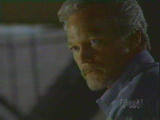 Horn and Black meet in Portland. Black instantly
picks up on Horn's apparently anxious manner -- which
Horn abruptly confirms sniping, "You profiling
me?" Black dispels Horn's quick accusation, "No
James, just wondering what's wrong." Horn confesses
his marriage is on the rocks. It is this event which will
color Horn's perceptions throughout the investigation.
Horn and Black meet in Portland. Black instantly
picks up on Horn's apparently anxious manner -- which
Horn abruptly confirms sniping, "You profiling
me?" Black dispels Horn's quick accusation, "No
James, just wondering what's wrong." Horn confesses
his marriage is on the rocks. It is this event which will
color Horn's perceptions throughout the investigation.Following up on Black's intuition that there was a message left by the killer at the scene of the crime, Horn and Black revisit the animal shelter. Horn battles to pursue hard evidence already in hand. Before the two get the opportunity to exchange their equally strong and opposite opinions, they are called away to investigate another, soon-to-be-proven similar, murder.
The killer has struck again, as Black predicted. This time the body is found in the dead letter repository of a local post office. Noticing a strand of the victim's hair set askew, Black finds his message. Written on that fiber of hair are the words, "Hair today, gone tomorrow."
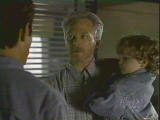 Horn and Black now start to work as a team. And
Horn brings his own insight to the investigation, "I
can't shake the feeling he's had prior contact (with his
victims). Something in my head, something in my
subconscious is telling me." Then, abruptly, Horn is
interrupted by a vision of the victims turning into
members of his family. As Horn's son, T.C., bursts into
the room to hug his father, the horrified Horn forces the
child out -- away from the pictures of the dead bodies
pinned to the wall and away from his terrible nightmare.
Horn and Black now start to work as a team. And
Horn brings his own insight to the investigation, "I
can't shake the feeling he's had prior contact (with his
victims). Something in my head, something in my
subconscious is telling me." Then, abruptly, Horn is
interrupted by a vision of the victims turning into
members of his family. As Horn's son, T.C., bursts into
the room to hug his father, the horrified Horn forces the
child out -- away from the pictures of the dead bodies
pinned to the wall and away from his terrible nightmare.To gain Horn's focus, Black decides to take Horn away from the gruesome scene to spend a brief, precious weekend with his child. But this seems only to aggravate Horn's inability to separate his personal life from the crimes.
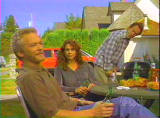 During a cookout, Horn revisits the crime as he
ponders his son's blissful
During a cookout, Horn revisits the crime as he
ponders his son's blissful ignorance of such
deeds. Black hypothesizes that the killer feels he has no
identity. He theorizes that the killer had trouble with
conventional sex/female relationships so he turned to a
prostitute. But that created a feeling of even more
meaninglessness in him, so he killed her before
consummation. And he got away with it, creating an anger
towards a world that should have punished him. Yet the
slaying was the most significant thing that ever happened
to him, so he returns to that crime -- to create a
significance to his life.
ignorance of such
deeds. Black hypothesizes that the killer feels he has no
identity. He theorizes that the killer had trouble with
conventional sex/female relationships so he turned to a
prostitute. But that created a feeling of even more
meaninglessness in him, so he killed her before
consummation. And he got away with it, creating an anger
towards a world that should have punished him. Yet the
slaying was the most significant thing that ever happened
to him, so he returns to that crime -- to create a
significance to his life. 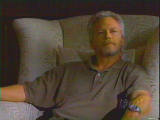 Horn is dealing with his own broken
relationship. Horn fears that he could fade into
nothingness if kept away from his son -- that he could
die faceless and unknown (perhaps even at the hands of
such a monster as the killer they now pursue).
Horn is dealing with his own broken
relationship. Horn fears that he could fade into
nothingness if kept away from his son -- that he could
die faceless and unknown (perhaps even at the hands of
such a monster as the killer they now pursue). The killer and Horn affect each other conversely. While the killer strives to have the world notice him by
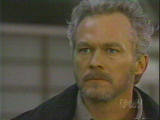 creating violence, when Horn does notice --
because of the value he has for his son -- he feels that
violence for the first time. The killer gives up his
social morality resolutely, and Horn finds his, almost
too passionately.
creating violence, when Horn does notice --
because of the value he has for his son -- he feels that
violence for the first time. The killer gives up his
social morality resolutely, and Horn finds his, almost
too passionately.The chase narrows when a piece of an eyeglass lens is found. After challenging the killer to prove his resourcefulness, the authorities get photos of possible suspects. These are sent to local eyeglass shops. One employee comes forth with a positive identification. Black recognizes that Horn was right; the killer does have prior contact with his victims, and this employee is his next target. A sting is set up, and the result is less than by the book.
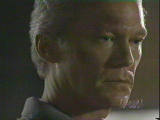 Steven Eramo for Cult Times asked, "How
would you describe James Horn?" "Overworked
(Morrison
Steven Eramo for Cult Times asked, "How
would you describe James Horn?" "Overworked
(Morrison 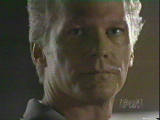 laughs.) It's interesting because I'd read
"Mind Hunter," which was a book written by
real-life serial killer profiler John Douglas. There's a
person in the book named James Horn, so my character was
a homage to this actual man. I also remember talking to
Glen Morgan about certain things that he related to on a
personal level involving the issue of serial killers and
fatherhood. The episode spoke to the father in me and how
Jim Horn relates to his work as a father and as a
protector of the innocent, both of which are recurring
themes on the series with the character of Frank
Black."
laughs.) It's interesting because I'd read
"Mind Hunter," which was a book written by
real-life serial killer profiler John Douglas. There's a
person in the book named James Horn, so my character was
a homage to this actual man. I also remember talking to
Glen Morgan about certain things that he related to on a
personal level involving the issue of serial killers and
fatherhood. The episode spoke to the father in me and how
Jim Horn relates to his work as a father and as a
protector of the innocent, both of which are recurring
themes on the series with the character of Frank
Black."This episode was directed by Thomas J. Wright who also directed the SPACE: ABOVE AND BEYOND episodes -- "Hostile Visit," "Stay With the Dead," "River of Stars," "Level of Necessity," "R & R," "Sugar Dirt," and "...Tell Our Moms We Done Our Best."
And it was written by Glen Morgan and James Wong "with me in mind, which is very nice," Morrison concludes. From an interview by Kathleen Toth
Additional images for Millenium can be found on the Picture Credits Page

